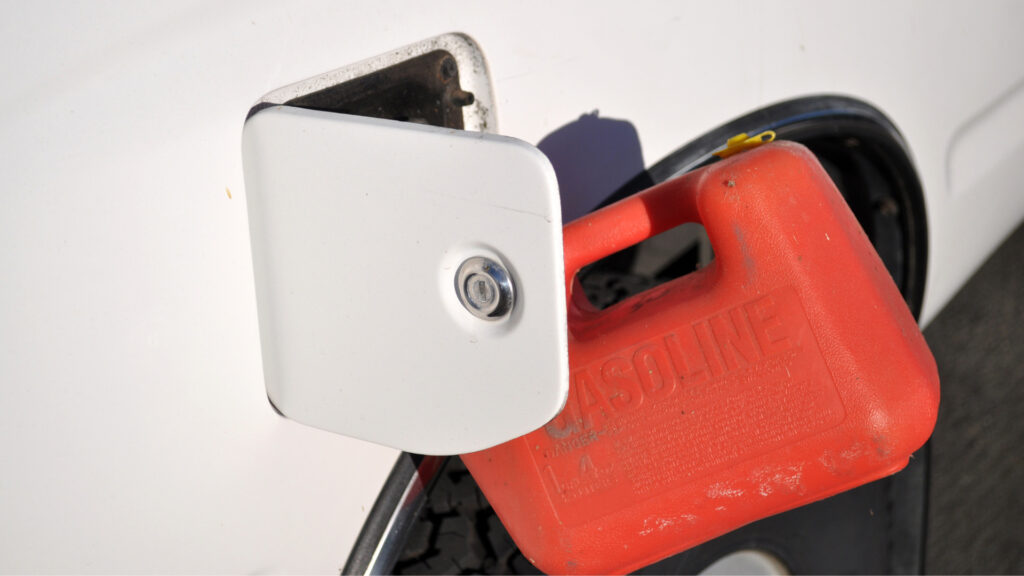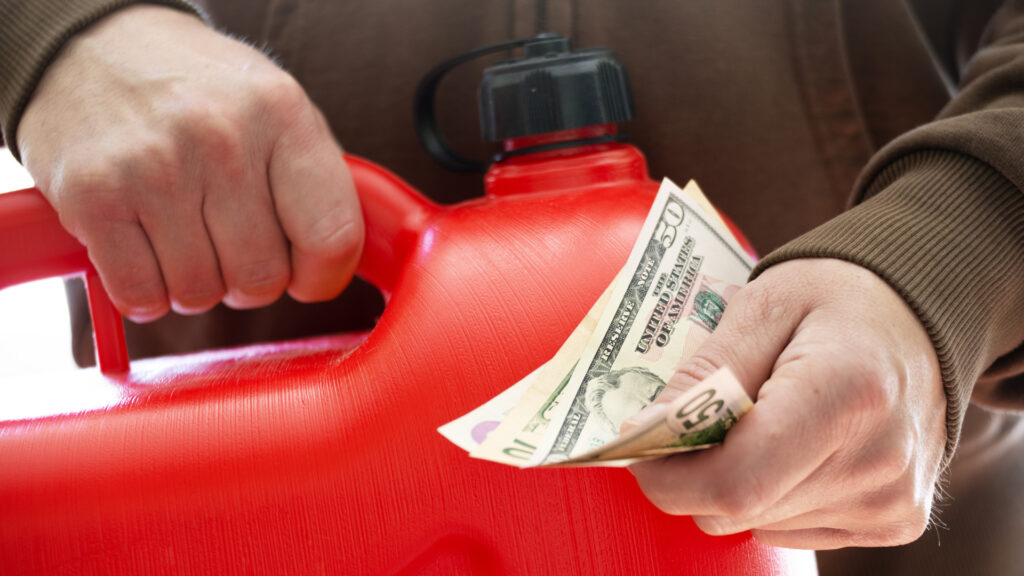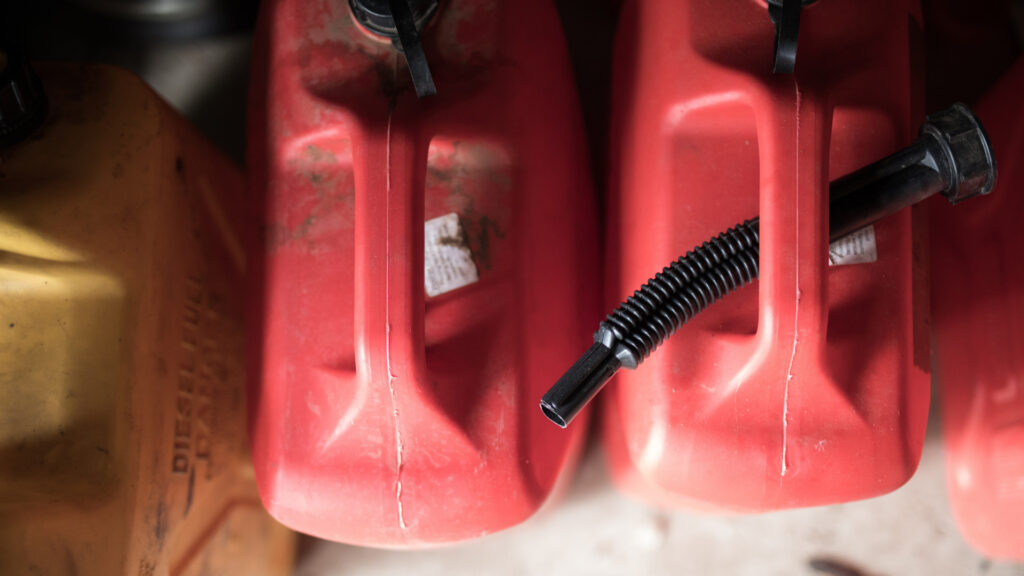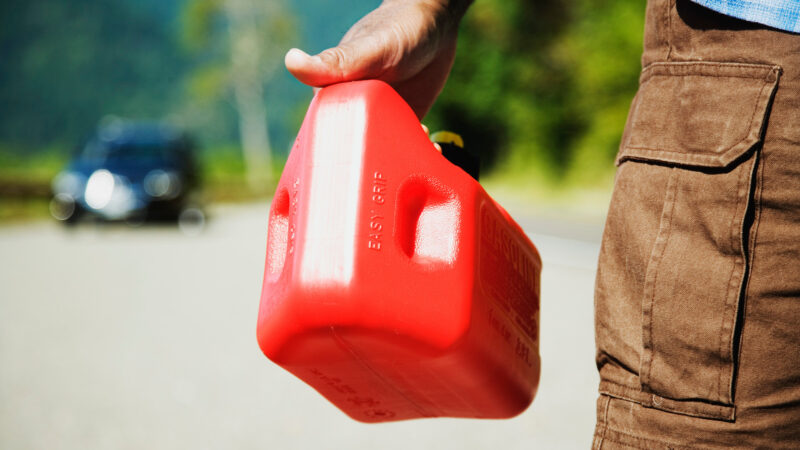Table of Contents Show
It’s not uncommon to find a can of gas sitting in a garage or garden shed.
People commonly use gas in cars and various small engines. However, you want to be careful about what gas you put in your vehicles. So does gas expire? What happens if you use bad gas?
Let’s dive in and get to the truth of this important topic.
What Is in Gasoline?
Gasoline is typically a mixture of approximately 150 different types of hydrocarbons.
These hydrocarbons include butane, pentane, and isopentane. However, gasoline also contains BTEX compounds: benzene, ethylbenzene, toluene, and xylenes.
As a whole, these various ingredients work together to protect the various systems in engines. They act as lubricants, anti-rust, and anti-icing agents that will help vehicles and other engines function as efficiently as possible.
Is It Possible for Gasoline to Expire?
So does gas expire? You can expect three to six months of shelf life if you buy regular gasoline from your local gas station. It’s important to remember that this is the typical shelf life when stored in optimal conditions.
However, it could have an even shorter shelf life if you store it in a shed or non-climate-controlled environment or if it’s an ethanol blend.
According to Rislone, “Fuel-stabilized gasoline can last between one and three years under optimal conditions. Gas stored in a car tank begins to degrade in just about a month.”
So while you want to make sure you have gasoline readily available, you don’t want to have so much that it goes bad before you can use it.

How Do You Know If Gas Is Expired?
If your gasoline has expired, it will have a darker or muddier color. You may notice a sour or awkward smell that you typically don’t experience with gas.
Keep an eye on the color and smell of your fuel before putting it into a vehicle or small engine.
What Happens If You Use Expired Gas?
Using expired gas in an engine can cause quite a few issues. For starters, expired gas will more likely convert into a gum-like substance and create blockages in your fuel system and engine.
Gasoline that contains ethanol can absorb moisture, which would increase the potential for corrosion in your fuel line and sensitive components.
Expired gas loses octane — its combustibility. As a result, you’ll likely experience a decrease in power and performance. If it’s a vehicle, you can expect slower acceleration and likely a reduction in fuel efficiency.
Addressing issues that arise as a result of expired gas can be frustrating and costly. When in doubt, never put old gasoline in your vehicle. Save yourself the hassle and only put fresh fuel in your engines.
Can I Mix Old Gas With New Gas?
As we’ve stated, old gasoline degrades over time. If you mix old and new gasoline, you’ll only lower the quality of the new fuel. You’ll likely experience many of the same issues that you’d experience when using expired gas.
If the gas has yet to lose its combustibility, you’ll likely be fine with mixing the old and new. However, if it has changed colors or lost its smell, you’ll want to avoid mixing it with fresh gasoline.
Reasons Gasoline Will Expire
Are you wondering what causes your gasoline to expire? Here are a few common reasons that gasoline will go bad.
Oxidation
While oxygen is a primary and essential component for combustion engines, it also causes oxidation. However, when your gasoline sits unused, its molecular structure changes.
Oxidation causes reduced combustion, which results in varnish and gumming throughout the fuel system. This will require you or a trusted professional to thoroughly clean it with a proper cleaning compound to remove it from the system.
Keep in Mind: Do you know what to do if you Put Gas in a Diesel Engine? If not, then you need to read this!

Water
Just like your drink loses flavor and taste when diluted by ice, the same is true for your gasoline. Most fuel in the United States contains some amount of ethanol in it.
Ethanol attracts water molecules in the air. As a result, expired gas can have water molecules, harming engines and various components.
Evaporation
Some of the hydrocarbons in gasoline evaporate easier than others, especially in the summer or hot temperatures. This is why it’s important where you store your gasoline.
When hydrocarbons evaporate, it accelerates the oxidation process. The longer the gasoline sits in less-than-ideal storage environments, the faster the gas will expire.
Tips for Storing Gasoline
If you want your fuel to last as long as possible, here are a few tips for storing your gasoline. For the best results, employ all of these when storing gas, so it doesn’t expire as quickly.
Metal Containers Are Best
When it comes to long-term storage, metal work best. The chemicals in a plastic container can potentially leach into the fuel and degrade it over time.
While the metal container can rust, it’s generally going to last substantially longer and be safer than plastic containers.
Use Fuel Stabilizer
Fuel stabilizer is a specifically formulated mixture that helps extend the life of gasoline. If you don’t know if you’ll use the gas in your tank before it expires, you’ll want to add a fuel stabilizer to the can when filling it.
This mixture helps prevent the ethanol from sucking in moisture in the air that gets absorbed into the fuel. Watery gasoline sitting in a fuel tank or the fuel lines of a small engine can cause blockages and clogs throughout the engine.
It could make it very difficult, if not impossible, for the engine to turn over after sitting for months at a time.
Keep in Mind: Do Fuel Saver Devices Actually Work? Let’s find out!
- PRESERVES FUEL: This fuel stabilizer ensures keeps gasoline fresh for up to 24 months for storing vehicles that are not...
- PREVENTS CORROSION: Safeguard your engine & fuel system from the detrimental effects of both ethanol & non-ethanol...
Be Careful Where You Store It
Store your fuel at room temperature and in an air-tight container. And limit the amount of oxygen that can get to your gasoline, which will accelerate the oxidation process. Additionally, avoid leaving it near heat sources, which will accelerate evaporation.
While a shed away from your home is the best place to store your containers, ensure it doesn’t get exposed to too extreme of conditions that it evaporates or oxidizes.

Don’t Buy Too Much
Avoid buying so much gas that it will likely go bad before you have time to use it. Even if you use a fuel stabilizer, the gasoline will last approximately two years.
Unless preparing for the apocalypse, most people find that a five-gallon gas can is sufficient. However, if you have toys like four-wheelers, dirt bikes, lawn mowers, or regularly use a generator, you may need a couple more gas cans to keep your tanks full.
Keep Your Gas Fresh
If you want to make sure your engines keep running efficiently, always use fresh gas. It may be inconvenient to dispose of your expired gas safely, but dealing with the problems expired gas can create in an engine is much more problematic.
You want your vehicles to run efficiently and perform to their maximum abilities. Using fresh gas is the best way to do that.
So, did you know gas can expire?
Last update on 2025-01-19 / Affiliate links / Images from Amazon Product Advertising API








STA-BIL Storage Fuel Stabilizer – Keeps Fuel Fresh For Up To Two Years, Effective In All Gasoline Including All Ethanol Blended Fuels, For Quick, Easy Starts. STA-BIL is the best stabilizer on the market today. I have used the product in my riding mower and all of my lawn equipment for many years. T=It is much better than any other cold weather and gas stabilizer on the market. There are other brands on the market but this one is far superior and works to protect the gas for longer with very little degradation. I don’t work for the company and I’m not paid for my review or comments. When I see and use a great product I like for others to try it for themselves. Have a great day!